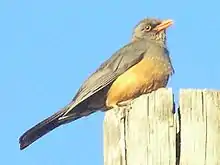Abyssinian thrush
The Abyssinian thrush (Turdus abyssinicus) is a passerine bird in the family Turdidae. It is also known as the African mountain thrush, or northern olive thrush The species was formerly treated as conspecific with the olive thrush (Turdus olivaceus) but the species were split based on the genetic differences. The ranges do not overlap. The Abyssinian thrush is found in Eritrea and other parts of the Horn of Africa, as well as an area to the southeast extending from the African Great Lakes region to north eastern Zambia and Malawi.[2]
| Abyssinian thrush | |
|---|---|
_(16341647185).jpg.webp) | |
| Scientific classification | |
| Domain: | Eukaryota |
| Kingdom: | Animalia |
| Phylum: | Chordata |
| Clade: | Dinosauria |
| Class: | Aves |
| Order: | Passeriformes |
| Family: | Turdidae |
| Genus: | Turdus |
| Species: | T. abyssinicus |
| Binomial name | |
| Turdus abyssinicus J. F. Gmelin, 1789 | |
| Synonyms | |
|
Turdus olivaceus abyssinicus | |
Taxonomy
The Abyssinian thrush was formally described in 1789 by the German naturalist Johann Friedrich Gmelin in his revised and expanded edition of Carl Linnaeus's Systema Naturae. He placed it with the thrushes in the genus Turdus and coined the binomial name Turdus abyssinicus.[3][4] Gmelin based his description on "Merle brun d'Abissinie" that had been described in 1775 by the French polymath Georges-Louis Leclerc, Comte de Buffon in his multi-volume work Histoire Naturelle des Oiseaux.[5]
The Abyssinian thrush was formerly usually considered to be conspecific with the olive thrush (Turdus olivaceus). The species were split based on the results of a molecular phylogenetic study published in 2005 that compared mitochondrial DNA sequences.[6][7]
Six subspecies are recognised:[7]
- T. a. abyssinicus Gmelin, JF, 1789 – Eritrea and Ethiopia to north, west, central Kenya, extreme north Tanzania, north Uganda and Sudan
- T. a. deckeni Cabanis, 1868 – north to northeast Tanzania
- T. a. oldeani Sclater, WL & Moreau, 1935 – central north Tanzania
- T. a. bambusicola Neumann, 1908 – east DR Congo to southwest Uganda and northwest Tanzania
- T. a. baraka (Sharpe, 1903) – Virunga Volcanoes (east DR Congo) and southwest Uganda
- T. a. nyikae Reichenow, 1904 – east, south Tanzania, north Malawi and northeast Zambia
Description

It is 22 centimetres (8.7 in) long. This variable forest thrush is generally darker than the African thrush and has an orange (not yellow) bill. It is also darker than the Kurrichane thrush and has no malar stripes. Generally the birds get darker at higher altitudes.[2]
Distribution, habitat and habits
The Abyssinian thrush occurs in the highlands of eastern Africa from South Sudan south to northern Mozambique.[8]
Its habitat includes forests woodlands, exotic plantations, parks and gardens.[8]
This species is a typical member of the genus Turdus but its habits and biology have been little studied, as it was considered to be a subspecies of olive thrush.[9]
References
- BirdLife International (2016). "Turdus abyssinicus". IUCN Red List of Threatened Species. 2016: e.T22734111A104354152. doi:10.2305/IUCN.UK.2016-3.RLTS.T22734111A104354152.en. Retrieved 18 November 2021.
- Sinclair & Ryan 2003, p. 440
- Gmelin, Johann Friedrich (1788). Systema naturae per regna tria naturae : secundum classes, ordines, genera, species, cum characteribus, differentiis, synonymis, locis (in Latin). Vol. 1, Part 2 (13th ed.). Lipsiae [Leipzig]: Georg. Emanuel. Beer.
- Mayr, Ernst; Paynter, Raymond A. Jr, eds. (1964). Check-List of Birds of the World. Vol. 10. Cambridge, Massachusetts: Museum of Comparative Zoology. p. 182.
- Buffon, Georges-Louis Leclerc de (1775). "Le Merle brun d'Abissinie". Histoire Naturelle des Oiseaux (in French). Vol. 3. Paris: De l'Imprimerie Royale. p. 407.
- Bowie, R.C.K.; Voelker, G.; Fjeldså, J.; Lens, L.; Hackett, S.J.; Crowe, T.M. (2005). "Systematics of the olive thrush Turdus olivaceus species complex with reference to the taxonomic status of the endangered Taita thrush T. helleri". Journal of Avian Biology. 36 (5): 391–404. doi:10.1111/j.0908-8857.2005.03459.x.
- Gill, Frank; Donsker, David; Rasmussen, Pamela, eds. (July 2023). "Thrushes". IOC World Bird List Version 13.2. International Ornithologists' Union. Retrieved 15 August 2023.
- "Abyssinian Thrush". Birdforum Opus. Birdforum.net. Archived from the original on 2016-11-07. Retrieved 2016-11-06.
- Clement, Peter; Hathway, Ren; Byers, Clive; Wiczur, Jan (2000). Thrushes. Christopher Helm. pp. 333–337. ISBN 978-0713639407.
Works cited
- Sinclair, Ian; Ryan, Peter (2003). Birds of Africa south of the Sahara. Cape Town: Struik.
